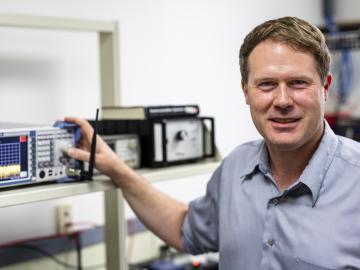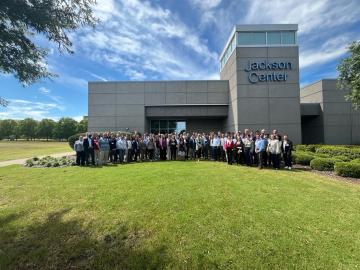
Filter News
Area of Research
- Advanced Manufacturing (11)
- Biology and Environment (43)
- Building Technologies (2)
- Computational Biology (1)
- Computational Engineering (1)
- Computer Science (9)
- Electricity and Smart Grid (1)
- Energy Science (143)
- Energy Sciences (1)
- Fuel Cycle Science and Technology (1)
- Functional Materials for Energy (1)
- Fusion and Fission (15)
- Fusion Energy (9)
- Isotope Development and Production (1)
- Isotopes (3)
- Materials (99)
- Materials Characterization (1)
- Materials for Computing (19)
- Materials Under Extremes (1)
- National Security (49)
- Neutron Science (36)
- Nuclear Science and Technology (17)
- Nuclear Systems Modeling, Simulation and Validation (1)
- Quantum information Science (1)
- Supercomputing (67)
- Transportation Systems (2)
News Topics
- (-) Advanced Reactors (40)
- (-) Artificial Intelligence (131)
- (-) Materials Science (158)
- (-) Molten Salt (10)
- (-) National Security (86)
- (-) Transportation (103)
- 3-D Printing/Advanced Manufacturing (146)
- Big Data (79)
- Bioenergy (112)
- Biology (128)
- Biomedical (73)
- Biotechnology (39)
- Buildings (74)
- Chemical Sciences (86)
- Clean Water (33)
- Composites (35)
- Computer Science (226)
- Coronavirus (48)
- Critical Materials (29)
- Cybersecurity (35)
- Education (5)
- Element Discovery (1)
- Emergency (4)
- Energy Storage (114)
- Environment (218)
- Exascale Computing (67)
- Fossil Energy (8)
- Frontier (64)
- Fusion (66)
- Grid (74)
- High-Performance Computing (130)
- Hydropower (12)
- Irradiation (3)
- Isotopes (62)
- ITER (9)
- Machine Learning (68)
- Materials (157)
- Mathematics (12)
- Mercury (12)
- Microelectronics (4)
- Microscopy (56)
- Nanotechnology (64)
- Neutron Science (171)
- Nuclear Energy (122)
- Partnerships (68)
- Physics (69)
- Polymers (35)
- Quantum Computing (53)
- Quantum Science (92)
- Security (31)
- Simulation (65)
- Software (1)
- Space Exploration (26)
- Statistics (4)
- Summit (71)
Media Contacts

Joel Brogan, who leads the Multimodal Sensor Analytics group at Oak Ridge National Laboratory, has been elevated to senior membership in the Institute of Electrical and Electronics Engineers.

ORNL has been recognized in the 21st edition of the HPCwire Readers’ and Editors’ Choice Awards, presented at the 2024 International Conference for High Performance Computing, Networking, Storage and Analysis in Atlanta, Georgia.

Two-and-a-half years after breaking the exascale barrier, the Frontier supercomputer at the Department of Energy’s Oak Ridge National Laboratory continues to set new standards for its computing speed and performance.

Researchers used the world’s fastest supercomputer, Frontier, to train an AI model that designs proteins, with applications in fields like vaccines, cancer treatments, and environmental bioremediation. The study earned a finalist nomination for the Gordon Bell Prize, recognizing innovation in high-performance computing for science.

Researchers at Oak Ridge National Laboratory used the Frontier supercomputer to train the world’s largest AI model for weather prediction, paving the way for hyperlocal, ultra-accurate forecasts. This achievement earned them a finalist nomination for the prestigious Gordon Bell Prize for Climate Modeling.

The Proton Power Upgrade project at ORNL's Spallation Neutron Source has achieved its final key performance parameter of 1,250 hours of neutron production at 1.7 megawatts of proton beam power on a newly developed target.

Larry Seiber, an R&D staff member in the Vehicle Power Electronics group at the Department of Energy’s Oak Ridge National Laboratory, has been elevated to senior member of the Institute of Electrical and Electronics Engineers.

The Department of Energy’s Office of Electricity, in partnership with ORNL, has launched an experimental platform for energy sector-related data with enhanced emphasis on governance and usability.

ORNL researcher Corey Cooke investigates challenges in radar, digital signal processing and communications systems while serving as a joint faculty member at Tennessee Tech, teaching online courses and advising graduate students to create a pipeline for new researchers to the lab and support the growth of current staff.

ORNL and NASA co-hosted the fourth iteration of this invitation-only event, which brings together geospatial, computational, data and engineering experts around a theme. This year’s gathering focused on how artificial intelligence foundation models can enable geospatial digital twins.


